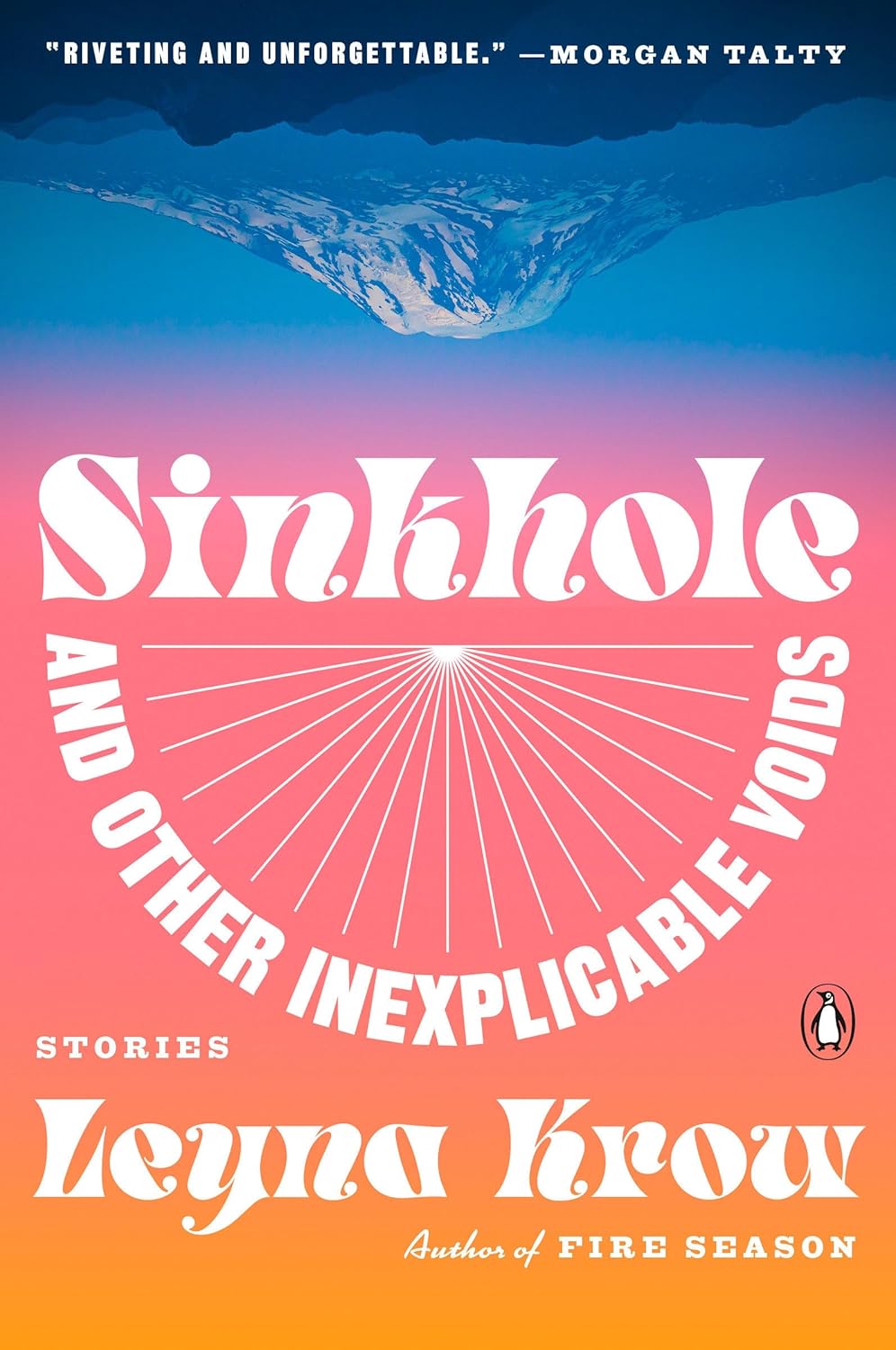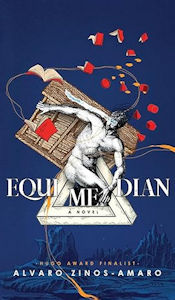Sinkhole and Other Inexplicable Voids by Leyna Krow: Review by Ian Mond
 Sinkhole and Other Inexplicable Voids, Leyna Krow (Penguin 978-0-59329-965-4, $19.00, 304pp, tp) January 2025.
Sinkhole and Other Inexplicable Voids, Leyna Krow (Penguin 978-0-59329-965-4, $19.00, 304pp, tp) January 2025.
Leyna Krow’s terrific second collection, Sinkhole and Other Inexplicable Voids, assembles 16 stories that take an askew, sometimes surreal, frequently funny attitude to the physical and emotional bonds that bind us (and octopuses) together.
“Sinkhole” is the collection’s title piece and has been optioned for a Hollywood adaptation, care of Jordan Peele and Issa Rae. It’s easy to see why Peele was drawn to the story: The premise is brimming with potential, much of which Krow deliberately leaves unexplored. A couple buys a large house made affordable because of a massive, gaping sinkhole in the backyard. When a broken flashlight falls into the sinkhole only to reappear on the kitchen table, fully functional, the couple realises the hole has restorative powers. But can it fix people, too? The piece has a sinister edge, with Krow leaving it to the reader’s imagination as to what would happen if a person jumped into the stygian abyss. If “Sinkhole” is produced, I suspect this is the question the movie will seek to address.
“Sinkhole” epitomises Krow’s approach to the absurd: strange, a little sinister, and awkwardly funny. We find similar qualities in “Moser”, which sees the narrator reconnect with Becca, an old college friend she’s long envied. Becca, who was supposed to be nine months pregnant, gave birth months earlier to a newborn man. I don’t mean that figuratively: Becca’s baby, Moser, emerged fully grown. When the narrator is asked to care for Moser, she “accidentally” gets the man-child pissed on Bloody Marys. “Moser” isn’t just a funny, cringey story with an absurdist conceit; it’s also a vulnerable depiction of insecurity and jealousy. “Tara’s Ultraboost Supplements for Good Health and Good Times” further cranks up the humour. As the title suggests, the titular Tara starts selling her brand of supplements to her best friends. These supplements radically change their bodies and states of mind (including a case of “goat eyes” and lycanthropy). Heaped with irony, the humour lies in the friend’s unwavering loyalty and SUPPORT (not my caps) despite the deteriorating situation.
My favourite story, narrowly beating the charming “The Octopus Finds Love at Home” (where a single lady octopus has a meet-cute with a male octopus in a neighbouring cave), is the brilliantly comedic “A Plan to Save Us All.” The story centres on a series of men who appear, one at a time, in a Meyersville cow paddock in 2003. Each bears the same dire message: “I’ve come from the future where a deadly pathogen that originated in this town has annihilated 90% of life on Earth. If nothing is done to stop it, it will kill everyone within a decade. But don’t worry; I have a plan to save us all.” The repeated message is one of the many running gags threaded through the story, which also includes each of the new arrivals meeting Mercy, who shows them around town and inevitably shags them. Like all great time-travel stories, “A Plan to Save Us All” explores how any single decision can shape the present and the future. But really, it’s just bloody funny.
While “A Plan to Save Us All” employs comedy to tackle an apocalyptic scenario, Krow’s approach to global warming is somewhat more sombre and grounded. In the bittersweet “The Unmatched Joy of Killing Something Beautiful”, ornithologist Ron and his girlfriend’s daughter bond briefly over the threat posed to the avian population by an invasive species of beautiful butterflies. Climate change and its impact is also central to a suite of five stories spread across the collection. The first of these pieces, “The Twin”, is more in keeping with Krow’s surrealist tales, beginning with the inexplicable appearance of a twin baby boy in a crib beside his brother. Although parents Jenna and Troy are understandably shocked, even frightened by this development, they note how reality bends around the baby – whom they name Nicholas. The subsequent four stories, told from the perspectives of Nick, Ruby (Nick’s older sister), and Jenna (their mother), skip further into the future, depicting a world struggling to address rising temperatures. Nick, who we learn in “Egret”, can create organic matter ex nihilo, implying that he, like God, brought himself into being, becomes a firefighter battling the never-ending furnace of the Californian wildfires. His twin brother, Jace, joins a climate activist (or terrorist) group overseas, while Ruby gets married and has a child, despite her friends opting out, refusing to bring new life into a world with an uncertain future. Their mother, Jenna, starts writing letters to her granddaughter that evoke the past but also provide hope for the future.
In the third of the five stories, “RIP Kittitas Bong Squad”, we learn of a cataclysmic event, a volcanic mudflow caused by melting glaciers in Mount Rainier, an incident that devastates parts of Seattle. The event is recounted in an astonishing tale, “Outburst”, that follows one of the researchers, Andi, desperately trying to warn others of the impending eruption. Knowing what will happen, including Andi’s fate, only makes this piece more intense. Like so many of the stories in this collection, “Outburst”, for all its depiction of the beauty and dangers of the natural world, is about family and how we seek to save but also comfort the ones we love, prioritising kindness over selfishness and hate. It’s an important message, one that’s all the more poignant post-November 5th.
Interested in this title? Your purchase through the links below brings us a small amount of affiliate income and helps us keep doing all the reviews you love to read!
Ian Mond loves to talk about books. For eight years he co-hosted a book podcast, The Writer and the Critic, with Kirstyn McDermott. Recently he has revived his blog, The Hysterical Hamster, and is again posting mostly vulgar reviews on an eclectic range of literary and genre novels. You can also follow Ian on Twitter (@Mondyboy) or contact him at mondyboy74@gmail.com.
This review and more like it in the January 2025 issue of Locus.
 While you are here, please take a moment to support Locus with a one-time or recurring donation. We rely on reader donations to keep the magazine and site going, and would like to keep the site paywall free, but WE NEED YOUR FINANCIAL SUPPORT to continue quality coverage of the science fiction and fantasy field.
While you are here, please take a moment to support Locus with a one-time or recurring donation. We rely on reader donations to keep the magazine and site going, and would like to keep the site paywall free, but WE NEED YOUR FINANCIAL SUPPORT to continue quality coverage of the science fiction and fantasy field.
©Locus Magazine. Copyrighted material may not be republished without permission of LSFF.








